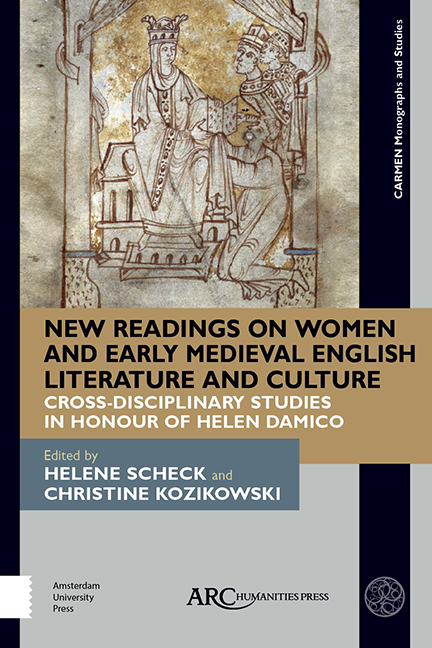 New Readings on Women and Early Medieval English Literature and Culture
New Readings on Women and Early Medieval English Literature and Culture Book contents
- Frontmatter
- Contents
- List of Illustrations
- List of Abbreviations
- Note from the Editors
- Introduction: Feminism and Early English Studies Now
- PART ONE LITERACY AND MATERIAL CULTURE
- PART TWO ENGENDERING MARRIAGE AND FAMILY
- PART THREE WOMEN OF THE BEOWULF MANUSCRIPT
- PART FOUR WOMEN AND ANGLO-SAXON STUDIES
- Select Bibliography
- Index of Manuscripts
- General Index
12 - Reading Grendel’s Mother
Published online by Cambridge University Press: 20 November 2020
- Frontmatter
- Contents
- List of Illustrations
- List of Abbreviations
- Note from the Editors
- Introduction: Feminism and Early English Studies Now
- PART ONE LITERACY AND MATERIAL CULTURE
- PART TWO ENGENDERING MARRIAGE AND FAMILY
- PART THREE WOMEN OF THE BEOWULF MANUSCRIPT
- PART FOUR WOMEN AND ANGLO-SAXON STUDIES
- Select Bibliography
- Index of Manuscripts
- General Index
Summary
IN A GRADUATE seminar on Beowulf, I was astonished to read in J. R. R. Tolkien's canonical (and iconoclastic) 1936 lecture on the Old English epic, “Beowulf: The Monsters and the Critics,” that the monsters— so essential to what he describes as the “underlying ideas of the poem”— are only basically two, Grendel and the Dragon.2 He counts them as two because they relate to the two halves of the poem that balance the youth and old age of the protagonist Beowulf, akin to the balance of the Anglo-Saxon line, “an opposition between two halves of roughly equivalent weight, and significant content.” In fact, his most famous description of the whole epic characterizes it as
essentially a balance, an opposition of ends and beginnings. In its simplest terms it is a contrasted description of two moments in a great life, rising and setting; an elaboration of the ancient and intensely moving contrast between youth and age, first achievement and final death. It is divided in consequence into two opposed portions, different in matter, manner, and length: A from 1 to 2199 (including an exordium of 52 lines); B from 2200 to 3182 (the end).
Tolkien, of course, was countering W. P. Ker's criticism of the poem in The Dark Ages (1904), one that claimed “The fault of Beowulf is that there is nothing much in the story.” While Ker's criticism may seem astounding to us now, the distinguished professor explains that:
The hero is occupied in killing monsters, like Hercules or Theseus. But there are other things in the lives of Hercules and Theseus besides the killing of the Hydra or of Procrustes. Beowulf has nothing else to do, when he has killed Grendel and Grendel's mother in Denmark: he goes home to his own Gautland, until at last the rolling years bring the Fire-drake and his last adventure. It is too simple […] Yet with this radical defect, a disproportion […] puts the irrelevances in the centre and the serious things on the outer edges.
These fights may have seemed simple and irrelevant to Ker— but not to Tolkien. For him, Beowulf is “at war with the hostile world,” a man who must, at the end of his life, confront the final “dragon”— death— a battle that Tolkien hardly regarded as peripheral.
- Type
- Chapter
- Information
- New Readings on Women and Early Medieval English Literature and CultureCross-Disciplinary Studies in Honour of Helen Damico, pp. 209 - 226Publisher: Amsterdam University PressPrint publication year: 2019


